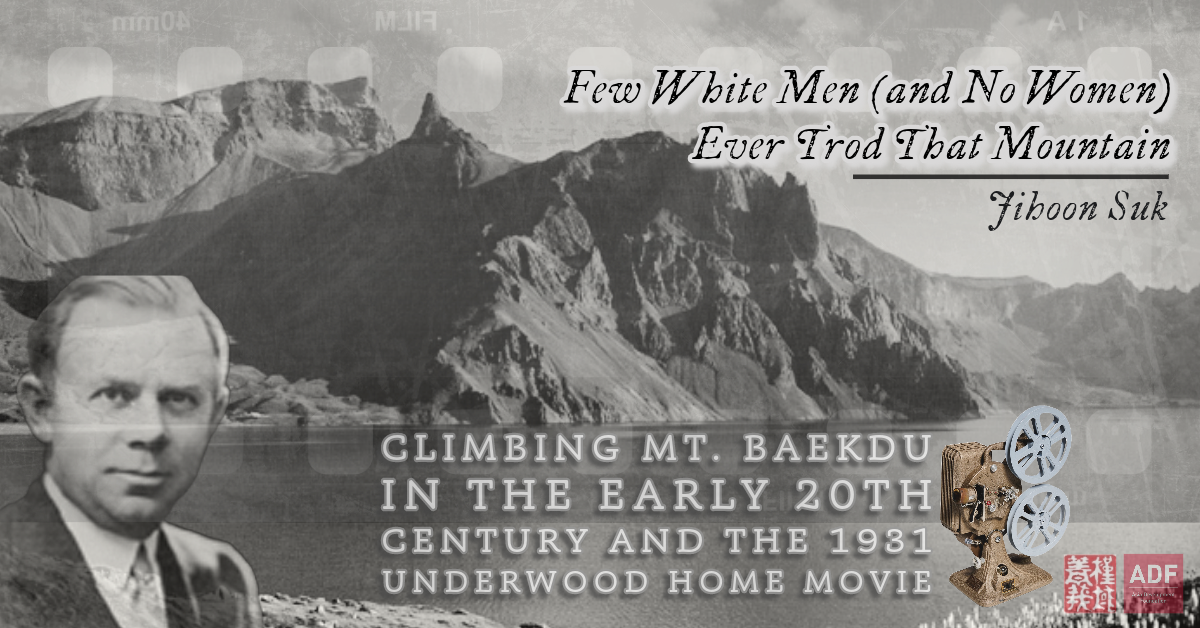Sharing the lecture held on October 10, 2023
“Few White Men (and No Women) Ever Trod That Mountain”: Climbing Mt. Baekdu in the Early 20th Century and the 1931 Underwood Home Movie
SPEAKER: Jihoon SUK
SUMMARY:
Since the beginning of the 20th century, Mt. Baekdu (Baekdu-san), located on the northeast corner of the Korean peninsula and the highest mountain within the peninsula, has been identified as a “sacred” mountain for the Korean nation, often employed as a symbol of Korean pride. Naturally, climbing the mountain itself had a unique Nationalistic connotation attached to it, as evidenced by the numerous published accounts of the climb during the colonial era. Few visual records exist, however, of the climbing of Mt. Baekdu from the era, and only one pre-1950 film footage of Mt. Baekdu exists: a 3-reel 16mm home movie, filmed by Horace Horton Underwood during his family “excursion” to the mountain in June-July 1931. Not only the film serves as the unique “video documentation” of the mountain and its surroundings, it also gives interesting insights on the perception of “Things Korean” among the expats living in Korea in the early 20th century. Excerpts from this film will be shown during the length of the lecture, which will discuss about the history of Korean nationalism associated with Korean geography, the development of modern geographical knowledge, and the process of “knowledge-making” related to them, done by various subjects (Koreans, Japanese, “Foreigners”) in the early 20th century.
BIO:
Jihoon Suk received his BA and MA in Korean modern history in Yonsei University. After studying in Asian Studies program at the Asian Languages and Cultures (ALC) department at University of Michigan, he is currently doing his Ph.D. in Korean modern history in Yonsei University. His primary research focuses on the role of modern (non-textual) media in the creation of the “sense” of cultural Korean-ness in the 20th He is also an avid collector and archivist of vintage sound recordings and film, having been working with various museums and archives in Korea and around the world, including The Independence Hall Museum of Korea, The National Archives of Korea, The National Library of Korea, The Korean Film Archive, The National Gugak Center, U.S. Library of Congress, The New York Public Library, and the University of Hawaii-Manoa.


![[Lecture Video Archive] ‘Jessi, Screen Feminism, and the Artistic Practice of Korean Instagram Models’ by Michael Hurt](http://raskb.com/wp-content/uploads/2024/04/Lecture_Hurt_20240409-500x383.png)
![[Lecture Video Archive] ‘The North Korean workers in Russia’ by Andrei Lankov](http://raskb.com/wp-content/uploads/2024/03/Lecture_Lankov_20240326_2-1-500x383.png)
![[Lecture Video Archive] ‘도시탐험: Korea’s developing urban exploration community’ by Jon Dunbar](http://raskb.com/wp-content/uploads/2024/02/poster-500x383.png)
![[Lecture Video Archive] ‘My 인연 with a 한옥’ by AnnA Cybele Paschke](http://raskb.com/wp-content/uploads/2024/02/Cybele-Take-2-500x383.png)
![[Lecture Video Archive] ‘Experimental Artists Confront Conformity in Seoul, 1968-70’ by Matt VanVolkenburg](http://raskb.com/wp-content/uploads/2023/12/VanVolkenburg_20240116-500x383.png)